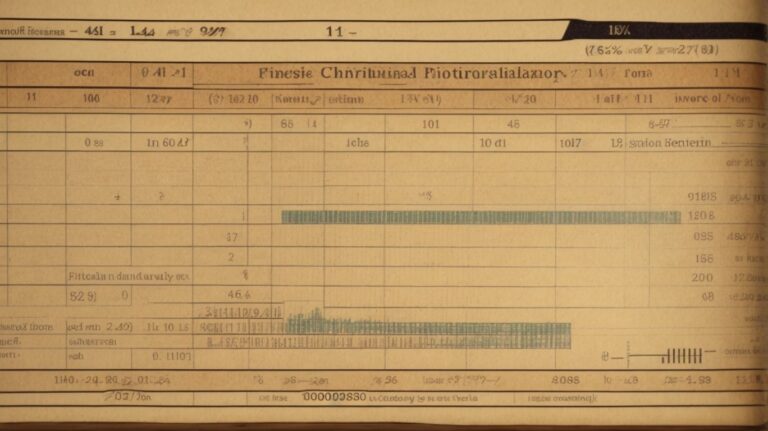Aptitude tests play a crucial role in the field of psychology, offering insights into an individual’s cognitive abilities, skills, and potential for success.
In this article, we will explore the different types of aptitude tests, their benefits, and how they are administered. From assessing strengths and weaknesses to providing career guidance, aptitude tests offer valuable information that can shape a person’s educational and professional journey.
We will also delve into the ethical considerations, validation, standardization, and limitations of aptitude tests, providing a comprehensive overview of their role and purpose in psychology.
Contents
- 1 Key Takeaways:
- 2 What Are Aptitude Tests?
- 3 How Are Aptitude Tests Used in Psychology?
- 4 What Are the Different Types of Aptitude Tests?
- 5 What Are the Benefits of Aptitude Tests?
- 6 How Are Aptitude Tests Administered?
- 7 What Are the Ethical Considerations for Using Aptitude Tests?
- 8 How Are Aptitude Tests Validated and Standardized?
- 9 What Are the Limitations of Aptitude Tests?
- 10 Frequently Asked Questions
- 10.1 What exactly are aptitude tests and how do they relate to psychology?
- 10.2 What is the purpose of administering aptitude tests in psychology?
- 10.3 How are aptitude tests different from achievement tests?
- 10.4 What are some common types of aptitude tests used in psychology?
- 10.5 How are aptitude tests scored and interpreted?
- 10.6 Are aptitude tests reliable and valid measures of an individual’s abilities?
Key Takeaways:
What Are Aptitude Tests?
Aptitude tests are assessments designed to evaluate an individual’s abilities, skills, and potential for academic and career success. These tests aim to measure an individual’s cognitive, verbal reasoning, numerical reasoning, abstract reasoning, and mechanical reasoning abilities.
These assessments are widely used in educational settings to determine a student’s academic potential and in the recruitment process to assess a candidate’s suitability for a specific role.
Aptitude tests assist in identifying an individual’s strengths and areas for development, providing valuable insights for career guidance and educational planning. They play a crucial role in helping individuals make informed decisions about their career paths and academic pursuits.
How Are Aptitude Tests Used in Psychology?
In psychology, aptitude tests are utilized to conduct psychometric assessments, analyze the concept of ability, and explore the factors influencing occupational activities. Kendra Cherry, MSEd, an authority in psychology, has contributed significantly to the understanding of aptitude tests.
These tests play a crucial role in evaluating an individual’s cognitive abilities, problem-solving skills, and decision-making processes.
By measuring specific skills such as verbal reasoning, numerical fluency, and spatial awareness, aptitude tests provide valuable insights into an individual’s potential for various occupational activities.
They are instrumental in identifying a person’s strengths and weaknesses, aiding in career counseling and professional development.
The results from aptitude tests can guide individuals toward suitable career paths and help employers make informed decisions about candidate selection and job placement.
What Are the Different Types of Aptitude Tests?
Aptitude tests encompass various types, including cognitive aptitude tests, specific aptitude tests tailored to particular skills, and comprehensive general aptitude tests such as the Differential Aptitude Tests (DAT) and the General Aptitude Test Battery (GATB). These tests undergo rigorous standardization processes as endorsed by the American Psychological Association.
Cognitive aptitude tests evaluate an individual’s cognitive abilities, such as critical thinking, problem-solving, and logical reasoning. These tests play a crucial role in academic and professional settings, providing insights into an individual’s potential for learning and problem-solving.
Specific aptitude tests, on the other hand, focus on particular skills, such as mechanical aptitude or spatial reasoning. The Differential Aptitude Tests (DAT) assess various aptitudes, including verbal reasoning, numerical ability, abstract reasoning, and mechanical reasoning. On the other hand, the General Aptitude Test Battery (GATB) is a comprehensive assessment of an individual’s aptitudes in various areas, providing valuable information for career counseling and vocational planning.
Cognitive Aptitude Tests
Cognitive aptitude tests are pivotal in assessing an individual’s intelligence and cognitive abilities, contributing to the research and practice in psychology. Experts, such as psychosocial rehabilitation specialists and psychology educators, have extensively explored the development and refinement of these tests through rigorous editorial processes and peer-reviewed studies.
This substantive involvement of psychology professionals signifies the profound impact of cognitive aptitude tests on intelligence assessment.
These tests encompass a wide range of cognitive functions, including reasoning, problem-solving, memory, and critical thinking skills, providing a comprehensive insight into an individual’s intellectual capabilities and potential for success in academic and professional pursuits.
Specific Aptitude Tests
Specific aptitude tests are tailored to evaluate particular skills and abilities in diverse educational settings, contributing to the development of individual Learning Plans (ILPs) and informing achievement tests. These tests employ psychometric assessments to measure specialized skills and potential.
Aptitude tests in educational settings play a crucial role in identifying and nurturing the unique strengths and talents of students. They assess various cognitive abilities, such as critical thinking, problem-solving, and spatial reasoning, which are vital for academic success.
The results of these tests inform the formulation of individualized Learning Plans (ILPs), enabling educators to tailor instruction and support to meet the specific needs of each student. Aptitude tests provide valuable insights into students’ potential career paths and help guide them towards suitable academic and vocational trajectories.
General Aptitude Tests
General aptitude tests, exemplified by the General Aptitude Test Battery (GATB) and the Aircrew Classification Battery, undergo meticulous construction processes, standardization procedures, and reliability coefficient analyses to ensure the establishment of accurate norms and reliable testing outcomes.
The construction phase involves the careful selection of test items to represent a wide spectrum of cognitive abilities. This includes verbal, numerical, and abstract reasoning, in order to capture the multifaceted nature of general aptitude.
Subsequent standardization processes aim to administer the test to a diverse and representative sample. This allows for the calibration of score interpretation. Rigorous reliability coefficient analyses are then conducted to verify the consistency and stability of the test results. This ensures that the tests produce dependable and reproducible measurements of general aptitude.
What Are the Benefits of Aptitude Tests?
Aptitude tests offer a multitude of benefits, including the assessment of an individual’s strengths and weaknesses, providing valuable career guidance, and identifying their potential for success in various pursuits.
Through the evaluation of cognitive abilities, personality traits, and specific skills, aptitude tests can aid individuals in making informed decisions about their academic or professional paths.
They also assist employers in selecting candidates whose skills align with job requirements, thereby improving workforce productivity and satisfaction. These tests promote self-awareness and help individuals recognize areas for improvement, ultimately enhancing personal development and overall performance.
Assessing Strengths and Weaknesses
Aptitude tests are instrumental in assessing an individual’s strengths and weaknesses across diverse domains such as verbal comprehension, spatial orientation, perceptual speed, and manual dexterity, facilitating comprehensive factor analyses to identify their unique abilities. The Role and Purpose of Aptitude Tests in Psychology
These tests play a crucial role in evaluating an individual’s cognitive and non-cognitive skills, often diving into their analytical reasoning, numerical ability, and mechanical aptitude.
By uncovering areas of proficiency and areas that may need improvement, these tests offer valuable insights for educational and career planning.
Moreover, aptitude tests aid employers in making informed hiring decisions by assessing candidates’ competencies related to the specific job roles.
Organizations utilize these evaluations to match candidates with roles that align with their strengths, thereby enhancing overall productivity and job satisfaction.
Career Guidance
Aptitude tests play a vital role in providing invaluable career guidance, particularly within educational settings, aiding in the development of individual Learning Plans (ILPs) and informing career suitability assessments through rigorous factor analyses.
These tests are designed to assess an individual’s innate abilities, strengths, and weaknesses, providing valuable insights into their potential career paths.
In educational settings, aptitude tests help professionals tailor individualized learning plans to address students’ unique strengths and needs, contributing to their overall academic success.
In the context of career suitability assessments, the results of these tests inform individuals about their compatibility with various occupational fields and guide them toward fulfilling and rewarding career choices.
The data obtained from aptitude tests is analyzed with meticulous attention to detail, ensuring the accuracy and reliability of the information for knowledge-based decision making and actionable career planning.
Identifying Potential for Success
Aptitude tests have the predictive capacity to identify an individual’s potential for success, leveraging standardized measures and reliability coefficients to offer valuable insights into their cognitive and intellectual abilities.
These tests are designed to assess various aspects of an individual’s cognitive functioning, such as logical reasoning, problem-solving skills, verbal and numerical abilities.
By utilizing standardized norms, they provide a common benchmark for evaluating candidates, ensuring fairness and consistency in the recruitment process.
The reliability coefficients of these evaluations establish their consistency and accuracy in measuring an individual’s potential, making them a valuable tool for employers to make informed decisions and predictions about a candidate’s future performance.
How Are Aptitude Tests Administered?
Aptitude tests are administered through various methods, including traditional paper-and-pencil tests, online assessments, and group or individual testing sessions, tailored to accommodate diverse testing environments and preferences.
Traditional paper-and-pencil tests involve providing test takers with a physical exam booklet and answer sheet, typically used in educational institutions or assessment centers.
Online assessments, on the other hand, offer the convenience of conducting tests via digital platforms, ensuring remote access and automated scoring.
Group testing sessions are suitable for evaluating a large number of candidates simultaneously, while individual testing allows a more personalized approach, catering to specific candidate needs and preferences.
Paper-and-Pencil Tests
Paper-and-pencil tests remain a prominent method for administering aptitude tests, particularly achievement tests aimed at evaluating academic potential through rigorous psychometric assessments.
Despite the growth of digital assessment tools, the enduring value of paper-and-pencil tests in aptitude evaluations cannot be understated. These traditional tests offer a tangible way to measure a student’s understanding, problem-solving skills, and analytical reasoning, providing valuable insights into their cognitive abilities and academic potential.
They allow for a standard, controlled testing environment and enable precise measurement of various dimensions of intelligence, knowledge, and achievement. The meticulous design and construction of these tests are crucial for ensuring the reliability and validity of the results, making them essential in academic assessment and selection processes.
Online Tests
Online tests serve as a convenient platform for conducting aptitude assessments, facilitating psychometric evaluations, exploring occupational activities, and analyzing the concept of ability through digital mediums.
Online tests offer numerous advantages. They provide flexibility in scheduling and can be accessed from any location with internet. This makes them ideal for individuals with busy schedules or those in remote areas. Additionally, online tests provide immediate scoring and feedback, allowing for quick insight into one’s strengths and areas needing improvement.
These tests are widely used in various fields, including education, recruitment, and career development. They are used to assess cognitive abilities, personality traits, and vocational interests. Employers and educators can utilize the results to make well-informed decisions and tailor individualized development plans.
Group or Individual Testing
Aptitude tests can be administered in both group and individual settings, allowing for comprehensive factor analyses, adherence to standardized norms, and the calculation of reliability coefficients to ensure accurate and reliable testing outcomes.
In group settings, aptitude tests provide valuable insights into the collective abilities and potential of a defined population. They offer a broad understanding of cognitive skills, reasoning, and problem-solving capabilities across diverse individuals.
On the other hand, individual testing scenarios enable the personalized assessment of a person’s strengths, weaknesses, and specific cognitive aptitudes. This fosters tailored support and guidance for personal and professional development.
What Are the Ethical Considerations for Using Aptitude Tests?
The utilization of aptitude tests necessitates diligent consideration of ethical implications, prompting the involvement of expert perspectives from psychosocial rehabilitation specialists, psychology educators, and authors with extensive experience in editorial processes and peer-reviewed studies.
Aptitude tests serve as critical tools for assessing an individual’s cognitive abilities, skills, and potential for various occupations and educational pursuits. Their usage raises ethical concerns related to fairness, bias, and the proper interpretation of results.
Psychosocial rehabilitation specialists play a crucial role in evaluating the potential impact of these tests on individuals’ mental well-being and self-perception. Likewise, psychology educators contribute to the ethical discourse by examining the validity, reliability, and appropriateness of these assessments in diverse contexts, emphasizing the importance of cultural sensitivity and inclusivity in test design and administration.
The input of authors experienced in editorial processes and peer-reviewed studies is essential to ensure that the ethical considerations related to aptitude tests are accurately captured and communicated within the academic and professional communities.
How Are Aptitude Tests Validated and Standardized?
Aptitude tests undergo rigorous validation and standardization processes, encompassing meticulous test construction, establishment of norms, and the calculation of reliability coefficients to ensure the accuracy and consistency of the assessment outcomes.
Test construction involves drafting questions that are both comprehensive and unbiased, ensuring they measure the designated skills or attributes accurately.
Establishing norms includes administering the test to a diverse sample population to ascertain average performance levels, enabling meaningful comparisons of individuals’ results.
The calculation of reliability coefficients, such as Cronbach’s alpha, assesses the consistency of scores obtained from the assessment, indicating the extent to which the test yields stable and dependable results.
What Are the Limitations of Aptitude Tests?
While aptitude tests offer valuable insights, they also possess inherent limitations related to the scope of psychometric assessments, the analysis of occupational activities, and the exploration of the concept of ability, necessitating a balanced understanding of their applicability and constraints.
One of the key limitations of aptitude tests lies in their exclusive focus on specific cognitive abilities and skills, often failing to capture the complete spectrum of an individual’s potential. This restricted scope may overlook crucial attributes such as emotional intelligence, creativity, or practical problem-solving abilities, which are essential in many occupational roles.
Aptitude tests may struggle to account for the impact of environmental factors, educational background, and personal experiences on an individual’s performance, thereby offering a limited view of their true capabilities.
Frequently Asked Questions
What exactly are aptitude tests and how do they relate to psychology?
Aptitude tests are standardized assessments designed to measure an individual’s potential to learn or perform in a specific area. In psychology, they are used to measure cognitive abilities, personality traits, and other factors that influence an individual’s behavior and performance.
What is the purpose of administering aptitude tests in psychology?
The purpose of aptitude tests in psychology is to gain a deeper understanding of an individual’s strengths, weaknesses, and potential for success in various areas. These tests can help with career guidance, academic placement, and identifying areas for improvement or development.
How are aptitude tests different from achievement tests?
Aptitude tests measure an individual’s potential or likelihood of success, while achievement tests measure what an individual has already learned or accomplished. In psychology, aptitude tests are used to predict future performance while achievement tests assess current knowledge or skills.
What are some common types of aptitude tests used in psychology?
Some common types of aptitude tests used in psychology include IQ tests, personality tests, career aptitude tests, and tests for specific cognitive abilities such as spatial reasoning or verbal abilities.
How are aptitude tests scored and interpreted?
Aptitude tests are scored based on a comparison to a normative group, typically individuals of the same age or education level. Scores are interpreted based on standard deviations, with a higher score indicating a stronger aptitude in that area.
Are aptitude tests reliable and valid measures of an individual’s abilities?
Yes, aptitude tests are generally considered reliable and valid measures in psychology. They undergo rigorous research and testing to ensure that they accurately measure what they are intended to measure and give consistent results over time. However, it’s important to keep in mind that no single test can fully capture an individual’s abilities and aptitudes.






